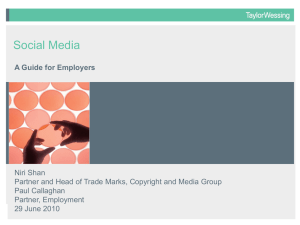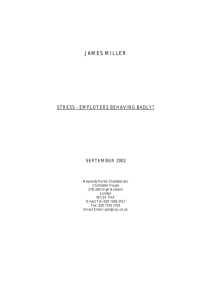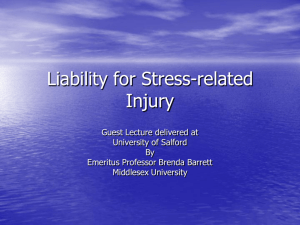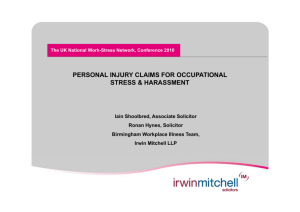stress in the workplace- legal considerations
advertisement
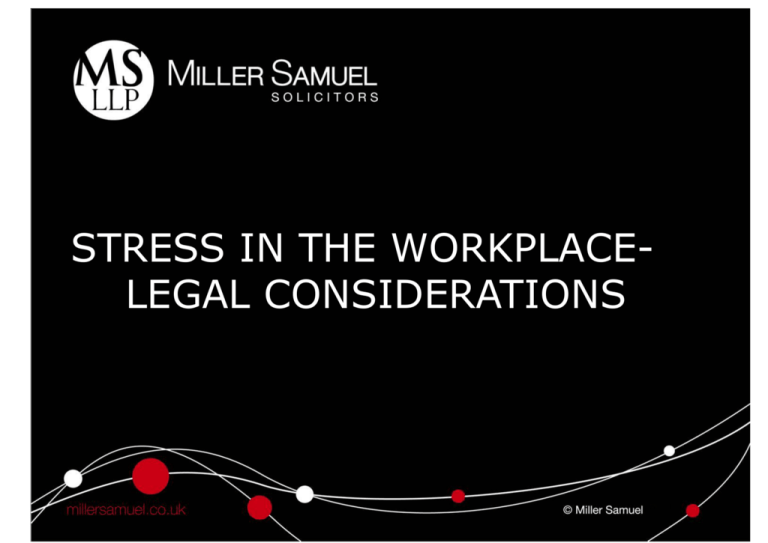
STRESS IN THE WORKPLACELEGAL CONSIDERATIONS “There cannot be a stressful crisis next week! My schedule is already full” Henry Kissinger Common Law Negligence The liability of employers for employees stress induced psychiatric illness. Employers are under a common law duty to take reasonable care for the Health & Safety of their employees in the workplace. Scope of Employers Duty of Care • Was the employee’s injury reasonably foreseeable by the employer? • Employers can be liable for employees bullying and harassment of other employees. The scope and extent of an employer’s duty of care – the cases Johnstone v Bloomsbury Health Authority 1991 – reasonably foreseeable that employer requiring an employee to work excessive hours would damage the employee’s health. Petch v Commissioners of Customs & Excise 1993 – employers duty of care extended to ensure duties allocated did not bring about a repetition of mental breakdown Walker v Northumberland 1995 – the standard expected of an employer must be measured against the yard stick of reasonable conduct on the part of the employer. Lancaster v Birmingham City Council 1999 - Employer at risk where employee unable to cope with a job for which inadequately trained Sutherland v Hatton 2002 - Guidelines on the employer’s common law obligations in relation to work place stress related illness Barber v Sommerset County Council 2004 (House of Lords) - Considered the status of the Sutherland v Hatton guidelines - Employers must take action to try and avoid any escalation of an employee’s illness and consequent liability for breach of their duty of care Post Hatton cases – the boundaries of foreseeability of workload stress Hartman v South Essex 2005 – another kind of work place stress Specific trauma stress, including bullying at work. Stress related physical injury Harding v The Pub Estate Company Limited 2005 - No difference to the issue of liability that the injury suffered was physical (a heart attack) rather than psychiatric illness Employment Rights and Stress • Unfair Dismissal • Breach of Contract • Constructive Dismissal • Protection from Harassment Act 1997 • Discrimination legislation • Working Time Regulations 1998 Charlie Sheen in Rooftop Protest Unfair Dismissal- Capability • Fair procedure • Employer’s conduct causes long term absence? – McADIE v. ROYAL BANK OF SCOTLAND [2007] EWCA Civ 806 • Disability Discrimination • Contractual right to Permanent Health Insurance? Breach of Contract The importance of implied terms: • Employer’s duty to provide a safe place of work – NOTTINGHAMSHIRE COUNTY COUNCIL v. PEREZ (EAT951/95) • Employer’s duty to provide support – WIGAN BOROUGH COUNCIL v. DAVIES (1979 ICR 411) • Employer’s duty to maintain a relationship of trust and confidence Constructive Dismissal An employee must establish:• There has been a fundamental breach of contract on the employer’s part • The employer’s breach of contract has directly led to the employee resigning • The employee has not delayed in resigning their position The Implied Term of Trust and Confidence and Stress • • • • • Increase in workload Refusal/ failure to provide alternative work Forced demotion Bad/ over-zealous management Disproportionate response to disciplinary matter • Bullying & Harassment Protection from Harassment Act 1997 • Must be a “course of conduct” • Conduct need not be on grounds of a protected characteristic • No need to establish a recognisable psychiatric condition • No reasonable steps defence available Bullying Offensive, intimidating, malicious or insulting behaviour, or an abuse or misuse of power through means intended to undermine, humiliate, denigrate or injure the recipient. Harassment A person subjects another person to harassment, where, for a reason related to a protected characteristic, they engage in unwanted conduct which has the purpose or effect of: a) violating that other person’s dignity; or b) creating an intimidating, hostile, degrading, humiliating or offensive environment for that person. Protected Characteristics • Sex • Race • Disability • Sexual Orientation • Religion or Belief • Age • Gender Reassignment • Marriage and civil partnership • Pregnancy and maternity Discriminatory Harassment • Requires to be on the ground of a protected characteristic • Liability can arise as a result of a one-off incident • Employer may harassment incur liability • “Reasonable steps” defence for “3rd party” Working Time Regulations 1996 • 48 hour limit on the working week – Employees may opt-out of the restriction • Daily rest breaks • Weekly rest periods • Annual leave entitlement • Special protection for night workers “It is impossible to enjoy idling thoroughly unless one has plenty of work to do.” - Jerome K. Jerome Fellow” “The Idle Thoughts of an Idle







